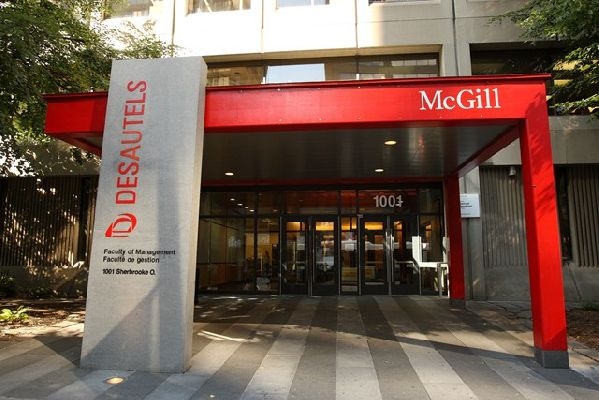On Monday, September 8, the Management Undergraduate Society (MUS) held its annual first year representative debates., where U0 and U1 candidates presented their campaign platforms with hopes of securing available positions on the Board of Directors. Their presentations were followed by a brief Q&A period, hosted by Chief Returning Officer Elan Eisner and VP Communications Matthieu Kamwa. Voting opens tonight at 6 pm EST, and ends on October 2.
U0
Samantha Ullrich wants to promote inclusivity and equity in the MUS by making Desautels more accessible to all. She began by stating the need for more indigenous land acknowledgements, and then discussed the importance of making online courses more accessible to all students, by including closed captioning whenever possible on recorded lectures. Her goals for inclusivity include gender as well. “It’s really hard for women to get involved [in business],” says Ullrich. Leadership, both in the MUS and in student clubs, should be at least 30 or 40 percent female-identifying students, according to Ullrich. “Everyone deserves a say in the workings of their faculty,” she said. Focusing on improving connections, and promoting diversity would be her main goals.
Anne Khazzam’s platform promised to remain realistic during a pandemic, while still ensuring that students could have fun and feel involved. One of the programs she would put into place would be weekly voluntary zoom hangouts for management students, where they could connect with their peers and make new friends. She wants to “create an effective bridge” between the student body and the MUS, hoping to personally reach out to every individual U0 management student possible. “Fun is an element that is forgotten in planning events,” explained Khazzam, “but it’s what keeps people coming back for more.” She believes that the MUS needs to work on promoting a welcoming environment, especially towards incoming students and students from other faculties. She also hopes to get rid of elitism in McGill’s business program, something she says plagues many other universities.
Jennifer Shi is “all about giving new students in first year the experience [they] deserve, no matter where in the world [they] are right now.” Involvement is her number one priority, something she says is easy to miss out on when you’re in online classes. Shi wants to make an Instagram page to inform people about club and leadership opportunities, in addition to organizing virtual meetups, where first years can receive advice from older students. As someone with experience organizing her high school’s prom, she hopes to help coordinate an in-person frosh whenever that is possible, an event she believes all McGill students deserve to experience. In order to improve accessibility for first year students, she hopes to encourage the MUS to transition from Facebook to more up-to-date platforms, including Instagram and TikTok. “MUS is kind of intimidating,” said Shi, and she hopes to improve the MUS’s relationship with first year students.
U1
Nabil Anouti has a decisive 3 point plan: Frosh, Smash, and Match. He is advocating for re-frosh: an in-person frosh at the end of the winter semester, which would include 3 days and 4 nights of fun. He has personally contacted local businesses that would host these frosh events and says that they are confident about their ability to be able to host smaller groups. Secondly, he hopes to promote a de-stigmatized mental health program with a fun event where students can smash a car to relieve stress. Lastly, he hopes to create a match program between international students and students living in Montreal so that they can create friendships and feel involved with the community, while also gaining new perspectives. He believes that creating hype around fun events should be done organically, and that it is incredibly necessary for students to want to be involved in events.
Nathaniel Saad was the president of the student union at his CEGEP, John Abbott College, and he believes that his experience will be valuable to the MUS and to first year students. Last spring, he helped the John Abbott College community deal with the transition from in-person to online learning. His platform has three parts; mental health, connectivity, and involvement. He wants to provide stress kits to McGill students, organize meet up events, and make sure that everyone has access to networking events and a direct connection to the MUS board of directors. He says that MUS is too impersonal, and that “a successful student government is one where every single member feels a personal connection to its representatives.” U1 students should all have the opportunity to add something to their CV, and he hopes to provide this through regular networking events. He also knows that the online curriculum is a huge weight on students and hopes to coordinate with McGill Mental Health Council to provide adequate resources for struggling students. He hopes to reach out to every single first year management student and get their input on what they need, and what MUS can do to meet those needs.
Raine Tse presented her platform under the acronym, “HIP,” which stands for hospitality, inclusivity, and performance. She hopes to improve on the MUS’s mentorship program, strengthening relationships between first years and upper year students, who can “help [U1 and U0 students] navigate McGill during this challenging year.” In terms of inclusivity, she hopes to create small groups of around 6 students who can meet over zoom, or in person when restrictions are lifted, so that they can become acquainted with their peers and create new friendships. Finally, she thinks that it is crucial for students to connect. As someone who moved to Toronto from Hong Kong at the age of 13, she is well aware of how important inclusivity is when being introduced to a new community. Not only does she hope to create awareness for first year students, but she believes that making sure the MUS leadership includes more people of colour and minorities is a crucial step towards true diversity.








